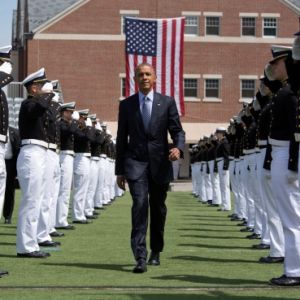Like many teenagers, I spent the summer before my senior year of high school visiting colleges. I dragged my parents to a medley of schools from Virginia to New York, leaving each one more unsatisfied than the last. I was vaguely aware of a desire to study a technical field, but there was something else that nagged at me, a gnawing in my brain to which I couldn’t put words. It wasn’t until I visited the Naval Academy that I realized I wanted more than a degree and a job—I wanted to be a leader.
During his speech at the Coast Guard Academy graduation last Tuesday, the President spoke of leadership in the face of oncoming danger and of stepping up and acting because “anything less is negligence.” Specifically, he was talking about our duty as a nation to act in the face of climate change.
This is a message that resonates with me. During my three deployments in the Navy, we protected oil routes, oil platforms, and oil tankers. I lost friends to fuel convoy attacks in Afghanistan and saw many others deploy for aid missions following natural disasters. In regions of the world devastated by drought, I recognized that food insecurity quickly turned into violence and fueled the rise of militia groups. The relationship between energy, climate, and national security was ever apparent everywhere I served.
In fact, the military has long been at the forefront of both recognizing this impending national security threat and in doing something about it. Military bases are pursuing ways to make their infrastructure more secure in the face of an aging electric grid and rising sea levels. Good warfighters also plan for the logistics of the mission; the military has aggressively pursued renewables to reduce the amount of liquid fuels that need to be transported to the battlefield.
This leadership on climate change is not without its detractors. Recently, members of the House Space, Science and Technology Committee voted to disallow the Department of Energy from working with the military for further biofuels development. Many members of this same Committee remain ardent climate change deniers despite the science. Still others ignore the stories of me and my fellow veterans who saw firsthand the effects of climate change on the world around us. These politicians focus on combatting extremism with military action without questioning the climate change induced resource scarcity that often precipitates that extremism.
To be honest, I care less about whether you doubt the science and more about whether you are willing to demonstrate leadership. America doesn’t get to pick and choose the threats that we want to face—that’s not how the military operates, and it shouldn’t be how our elected officials do, either. Climate change—and its consequences—will affect our nation, whether we’re ready or not. This is an opportunity to lead. Doing otherwise is simply negligence.

